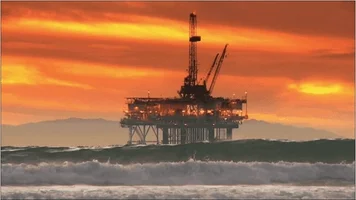By TIM FAULKNER/ecoRI
News staff
 Despite the government
shutdown, federal agencies are moving forward with permitting for seismic
airgun surveying and the offshore drilling for natural gas and oil that may
follow.
Despite the government
shutdown, federal agencies are moving forward with permitting for seismic
airgun surveying and the offshore drilling for natural gas and oil that may
follow.
Press liaisons are
furloughed, so it’s difficult to know the status of pending permits before the
Bureau of Ocean Energy Management (BOEM) and the Department of Interior.
Nevertheless, the five
exploration companies approved for sonic airgun blasting are still expected to
hear from the Department of Interior this month, after which they can
immediately begin surveying.
The Bureau of Safety and
Environmental Enforcement (BSEE) is processing paperwork, as more than half of
the agency’s 803 employees remain on the job, paid by “non-lapsing funds,”
according to BSEE.
“During the shut-down
BSEE will continue critical permitting and oversight activities associated with
energy development on the Outer Continental Shelf, so as to allow the bureau to
continue to support the sustained exploration and development of the Outer
Continental Shelf during the shut-down,” according to a Dec. 17, 2018 BSEE
statement.
Blasts from seismic
airguns disrupt many aquatic ecosystems and harm sea mammals such as North
Atlantic right whales, dolphins, and sea turtles, according to research.
During surveys, ships fire underwater sonic blasts for hours and even days, sending sonic booms with 100,000 times the intensity of a jet engine thousands of miles through the ocean.
The noise disrupts feeding, mating, and echolocation used by marine mammals. A 2017 study found that the sonic booms decimate vital sea life such as zooplankton.
During surveys, ships fire underwater sonic blasts for hours and even days, sending sonic booms with 100,000 times the intensity of a jet engine thousands of miles through the ocean.
The noise disrupts feeding, mating, and echolocation used by marine mammals. A 2017 study found that the sonic booms decimate vital sea life such as zooplankton.
Shortly before President
Trump took office in January 2017, BOEM denied the same
airgun activity because of potential harm to marine life. But the National
Oceanic and Atmospheric Administration (NOAA) reversed the decisions months
later, saying that sea animals can recover from any harm.
Several environmental groups are suing NOAA’s National Marine Fisheries Service for allowing fossil-fuel exploration companies to conduct the seismic airgun activities and thereby violate protections like the Endangered Species Act.
In Rhode Island, members
of the General Assembly joined elected officials from seven other states by
sponsoring legislation that bans offshore drilling. Sen. Dawn Euer, D-Newport,
and Rep. Lauren Carson, D-Newport, are expected to introduce matching bills in
the Senate and House.
“The state and our
institutions have invested incredible resources on forward-thinking coastal
policy initiatives. Opening up coastal waters to offshore drilling is
short-sighted and puts our economy at great risk,” Euer wrote in a press
statement.
The legislation would
prohibit oil drilling within state waters, which extends 3 nautical miles
offshore. The bill would also ban the construction of oil platforms and port
terminals and the installation of any equipment related to oil production
within the state. In 2018, the same bill died in committee in both the House
and Senate.
Similar legislation is
being filed in Georgia, Hawaii, Maine, Massachusetts, New Hampshire, New York,
and Oregon.
Massachusetts Rep. Dylan
Fernandez, D-Woods Hole, filed a bill that bans oil and gas drilling off the
coast of the Bay State.
In Washington, D.C.,
bipartisan steps were recently taken to stymie Trump’s plans for offshore
exploration and drilling. Rep. David Cicilline, D-R.I., introduced a bill that
prohibits the Department of the Interior from issuing leases for the
exploration, development, or production of oil or natural gas off the New
England coast.
Other representatives introduced bills protecting the Atlantic and Pacific coasts, the eastern Gulf of Mexico, Alaska, and the Arctic.
Other representatives introduced bills protecting the Atlantic and Pacific coasts, the eastern Gulf of Mexico, Alaska, and the Arctic.
“We’re not going to sit
by and watch as President Trump plunders our oceans for his friends in the big
oil companies,” Cicilline said.